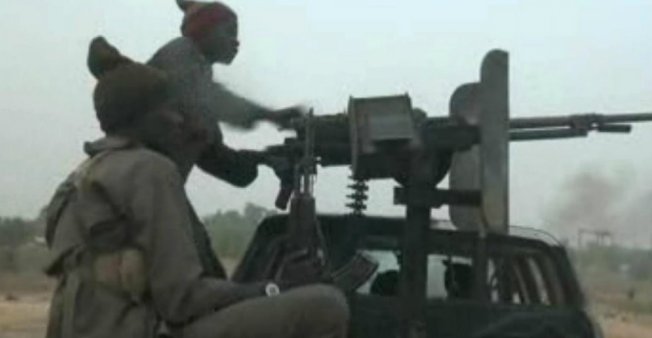Three separate attacks, including an assault on the military base of Monguno, killed dozens of people in Nigeria’s northeastern Borno state. Boko Haram, which has allied itself with the Islamic State West Africa Province (ISWAP), claimed responsibility for the attacks. The other two targets were a United Nations office and a refugee camp which hosts an estimated 150,000 displaced civilians.
The attack on Monguno was supported by heavy weapons and rocket launchers. At least 15 people, including a four-year-old girl, and nine soldiers died; many more were wounded. The U.N. confirmed in a statement that the “non-state armed group operatives” entered Monguno in the late morning. The Nigerian military said that its forces had “successfully repelled” the attack and killed 20 jihadists.
“They fired rocket-propelled grenades indiscriminately which fell on homes, killing three people and injuring many others,” a civilian told French news agency AFP. “I saw the bodies of the two soldiers and the militia member on the streets after the fighting.”
Civilians from the Goni Usmanti village in Nganzai told AFP that the jihadists shot and killed 38 people and set a truck on fire with passengers inside. The BBC reported that hundreds of civilians were injured in Nganzai during the attack and the local hospital was overwhelmed, forcing some of the injured to lie outside awaiting help.
Security officials said that at least 20 soldiers and 40 civilians were killed in the first two attacks. The third attack was perpetrated on Zuwo village in the Gubio area but the number of casualties there has not yet been confirmed because of poor telecommunication services in the area.
Idris Yahaya, a member of the local community security force told the AP the attackers burned down several houses in the village and that they have recovered “about 40 corpses in and around Usmanti village.”
The jihadists appeared to have come from the neighboring countries of Chad and Niger. The area around Lake Chad is where Boko Haram is most active and from where all three attacks sprang.
On June 9, in an earlier attack by ISWAP jihadists, 81 people were killed in Gubio.
Referring to the third attack, an unidentified member of the local security force said, “The well-armed attackers came in large numbers from three directions and took over the town for some hours before the military fought them back with the help of fighter planes.”
Another civilian witness claimed that the attackers came in 13 vehicles, including heavily armed trucks (technicals). The jihadists dropped leaflets written in English, Hausa, and Arabic warning people to stay away from the military, white Christian humanitarian organizations, and other “non-believers” because they are targets that can be attacked at any time.
Sagir Musa, a Nigerian military spokesman, said that the attackers sustained “a high number of casualties” and some of their weapons and equipment were destroyed.
Already have an account? Sign In
Two ways to continue to read this article.
Subscribe
$1.99
every 4 weeks
- Unlimited access to all articles
- Support independent journalism
- Ad-free reading experience
Subscribe Now
Recurring Monthly. Cancel Anytime.
Edward Kallon, the UN Humanitarian Coordinator in Nigeria said, “I am relieved all of the staff are safe and secure, but I am shocked by the intensity of this attack.”
The United Nations also said in a statement that it was “appalled” by the raids that came days after at least 81 villagers were killed in Gubio.
“Protective security measures deployed at the humanitarian hub prevented any harm to the over 50 aid workers who were in the facility at the time of the attack,” the UN added.
In the region’s 10-year-long conflict, ISWAP and Boko Haram jihadists have killed over 36,000 people and displaced around two million from their homes, according to the UN.










COMMENTS